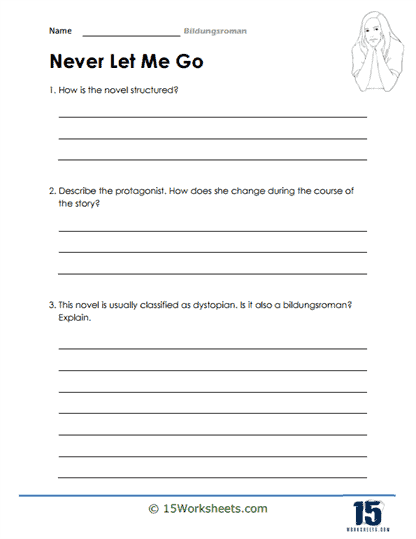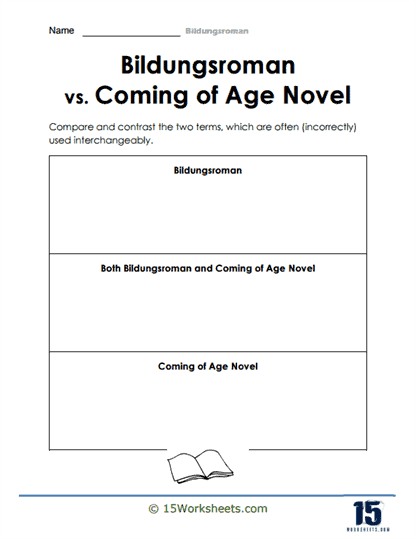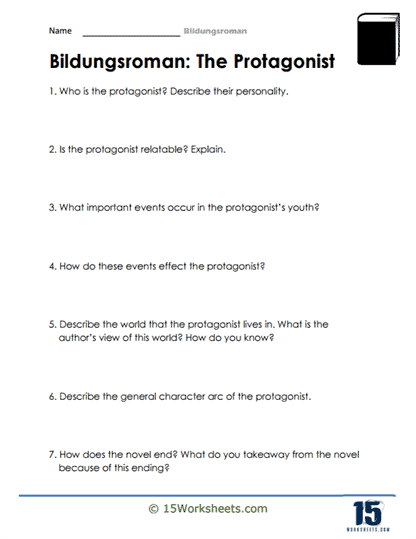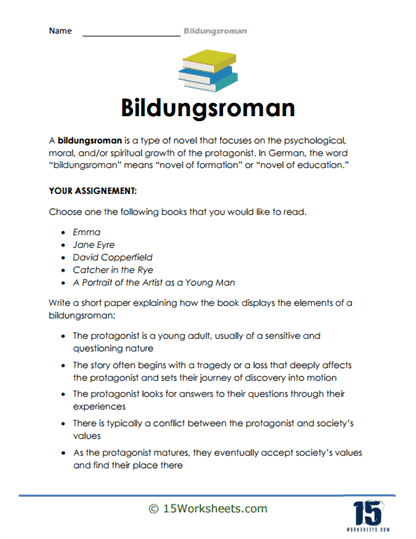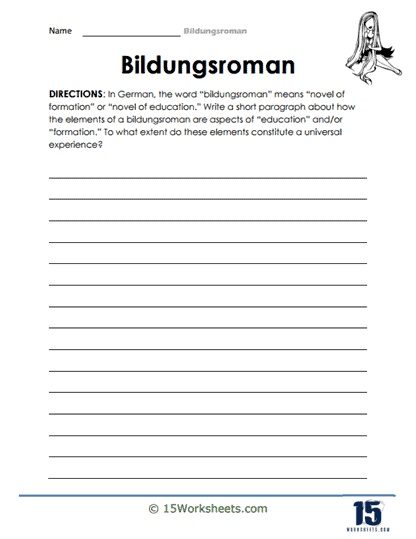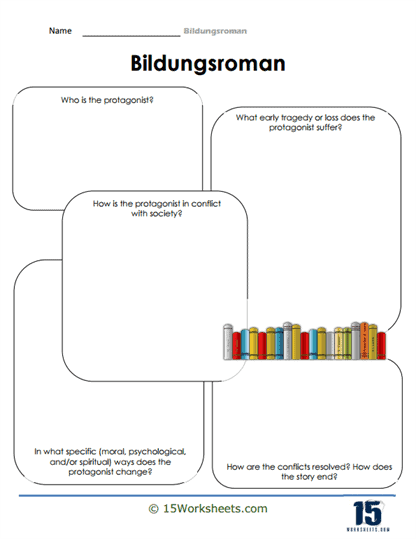Bildungsroman Worksheets
All About These 15 Worksheets
Bildungsroman, a genre of literature that focuses on the moral, psychological, and intellectual growth of the protagonist, is a captivating and enlightening aspect of storytelling. Understanding and engaging with Bildungsroman not only deepens a student’s appreciation for literary narratives but also enhances their critical thinking, empathy, and self-awareness.
In a world where personal development, self-discovery, and empathy for others are valued, students must develop the ability to recognize, analyze, and appreciate the transformative journeys of characters in Bildungsroman works. To empower students with the knowledge of Bildungsroman and its multifaceted themes, we proudly present a collection of 15 worksheets. These worksheets are meticulously designed to provide students with structured and engaging opportunities to explore, analyze, and appreciate the genre of Bildungsroman.
What Is Bildungsroman?
Our bildungsroman worksheets were developed to help students understand and analyze the literary genre known as Bildungsroman. A Bildungsroman is a type of novel that focuses on the moral, psychological, and intellectual growth and development of a protagonist, typically from childhood or adolescence to adulthood. These worksheets aim to enhance students’ understanding of Bildungsroman by providing examples, activities, and questions for analysis.
Students may be presented with excerpts or summaries of novels that fall within the Bildungsroman genre. The worksheets may ask students to identify the key elements of a Bildungsroman, such as the protagonist’s personal growth, the challenges they face, and the transformation they undergo.
Worksheets will include some questions that encourage students to analyze the protagonist’s development throughout the Bildungsroman. Students may be asked to identify pivotal moments or experiences that contribute to the character’s growth, examine the protagonist’s changing values or beliefs, and discuss the impact of these changes on the overall narrative.
The term “Bildungsroman” hails from German literature and it combines two words – “Bildung,” meaning education or formation, and “Roman,” meaning novel. It refers to a genre of novel that focuses on the psychological and moral growth of the protagonist from youth to adulthood, and in which, character change is thus extremely important. A Bildungsroman, often referred to as a coming-of-age story, typically details the protagonist’s formative years or spiritual education.
The main defining feature of a Bildungsroman is the focus on the protagonist’s process of maturity. The story will depict the journey of the central character, generally starting from adolescence and progressing into adulthood, showcasing their emotional, intellectual, and moral development.
Key Characteristics of Bildungsroman
Several key characteristics help define the Bildungsroman:
Growing Up or Coming of Age – The protagonist starts the novel as a child, or naïve young individual, and the story traces their journey into maturity.
Search for Identity – The protagonist often searches for their role in society and their self-identity.
Conflict with Society – The protagonist typically experiences a conflict between their personal desires and the values and expectations of society.
Psychological and Moral Growth – The novel focuses on the internal growth and development of the protagonist.
A Journey – This can be a literal journey that leads to self-discovery or a metaphorical journey involving self-reflection and understanding.
An Epiphany or Self-Realization – The story concludes when the protagonist has an essential revelation that marks their coming-of-age and acceptance into adult society.
Authors employ Bildungsroman as a narrative strategy to explore the development of the protagonist’s character and morals in relation to society. It allows authors to delve deep into the protagonist’s psyche, motivations, and moral universe, presenting a nuanced view of the individual’s maturation process.
Examples in Literature
Consider the following examples of Bildungsroman in literature:
“To Kill a Mockingbird” by Harper Lee – This novel traces the moral development of Scout, a young girl living in the racially charged environment of the American South during the Great Depression. Throughout the novel, Scout learns about empathy, justice, and the complexities of the adult world, primarily through her father Atticus and the racial injustices she witnesses.
“The Catcher in the Rye” by J.D. Salinger – The novel follows a few days in the life of sixteen-year-old Holden Caulfield. Struggling with mental health issues and the death of his younger brother, Holden’s journey is about coming to terms with the realities of the adult world, from which he initially tries to run away.
“Great Expectations” by Charles Dickens – The novel follows Pip, an orphan, from his childhood, through a vast and unexpected change in his social status, and into his disillusioned adulthood. Through a series of misadventures and experiences, Pip learns valuable lessons about love, forgiveness, and social class.
The Bildungsroman has a profound effect on readers. It provides a relatable exploration of the universally human experience of growing up, which can prompt self-reflection and empathy. It allows readers to engage with the protagonist’s journey, experiencing their struggles, growth, and revelations vicariously, and it can offer valuable insights into the complexities of coming-of-age, the search for identity, and the relationship between the individual and society. Thus, the Bildungsroman not only entertains but also educates and prompts introspection, expanding the reader’s understanding of their own self and the world around them.
The Importance of Understanding Bildungsroman For Students
Understanding Bildungsroman and its various elements is of great importance for several reasons:
- Literary Appreciation: Bildungsroman is a fundamental genre in literature, offering insights into the human experience and personal growth. Recognizing Bildungsroman enhances students’ appreciation of character development and narrative structure.
- Empathy and Self-Awareness: Exploring the journeys of Bildungsroman protagonists fosters empathy as students relate to the characters’ struggles, growth, and self-discovery. It also encourages self-reflection and personal development.
- Critical Analysis: Recognizing Bildungsroman in literature challenges students to think critically about the themes of identity, maturation, and societal influences.
- Cultural and Historical Understanding: Bildungsroman works often reflect the cultural and historical contexts in which they are set, providing insights into different time periods and societies.
This collection of Bildungsroman worksheets is a valuable resource for educators and parents committed to nurturing literary appreciation, empathy, and critical thinking skills in students. Proficiency in recognizing, analyzing, and appreciating Bildungsroman equips individuals with the tools to engage with literature on a profound level, relate to the experiences of fictional characters, and embark on their own journeys of personal growth and self-discovery.
This collection is an investment in their future success, ensuring they have the skills to appreciate the complexities of human development, engage with literature that explores the human condition, and apply the lessons of Bildungsroman to their own lives. Explore these worksheets today, and watch your students become empathetic, reflective, and discerning individuals who can unveil the profound narratives of personal transformation in the captivating world of Bildungsroman.






